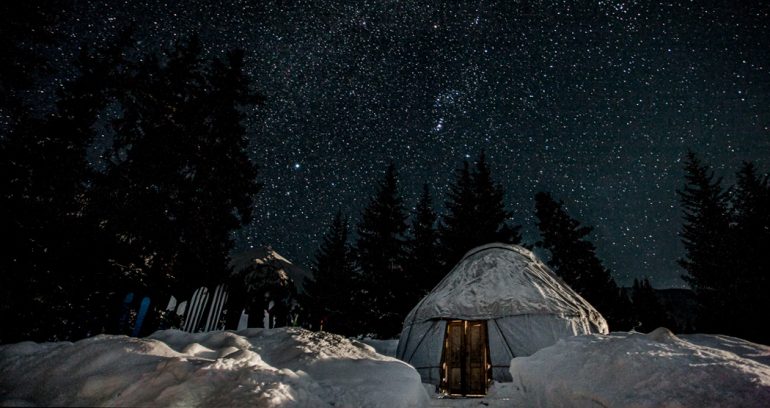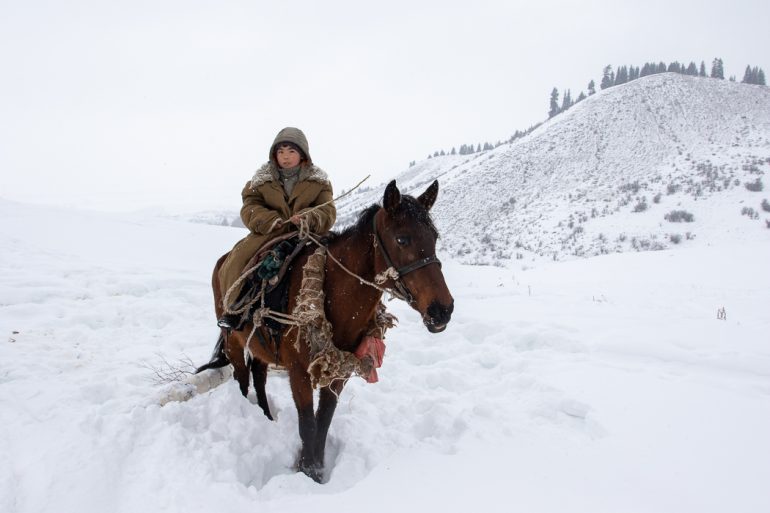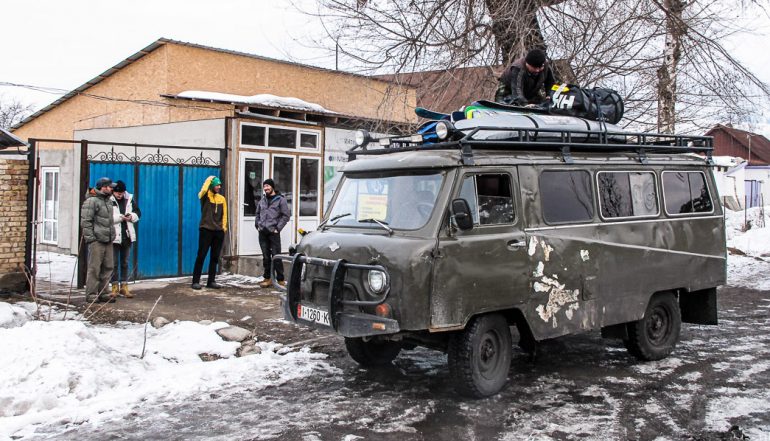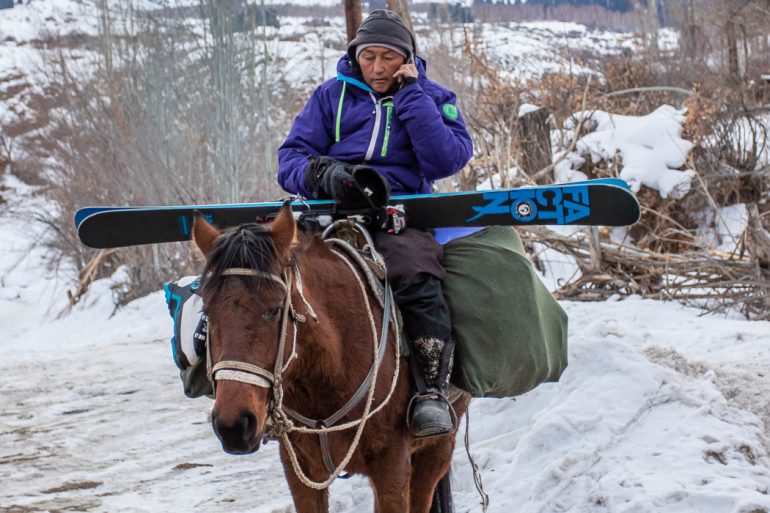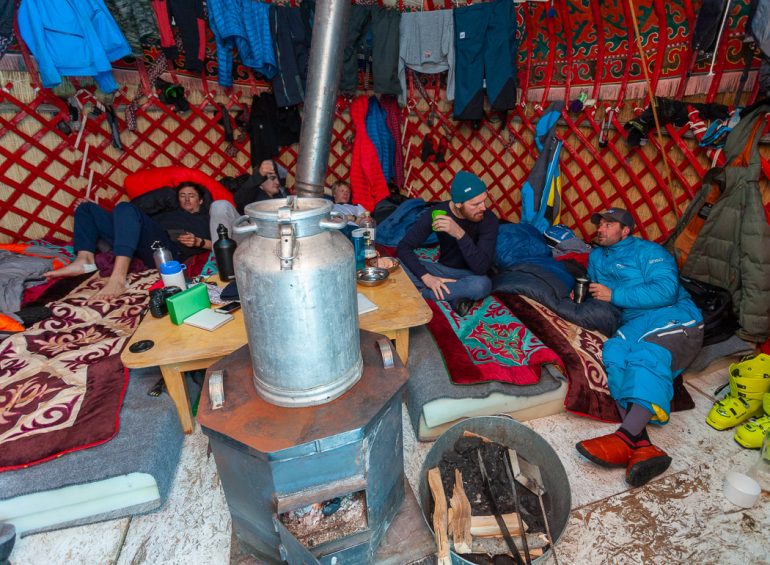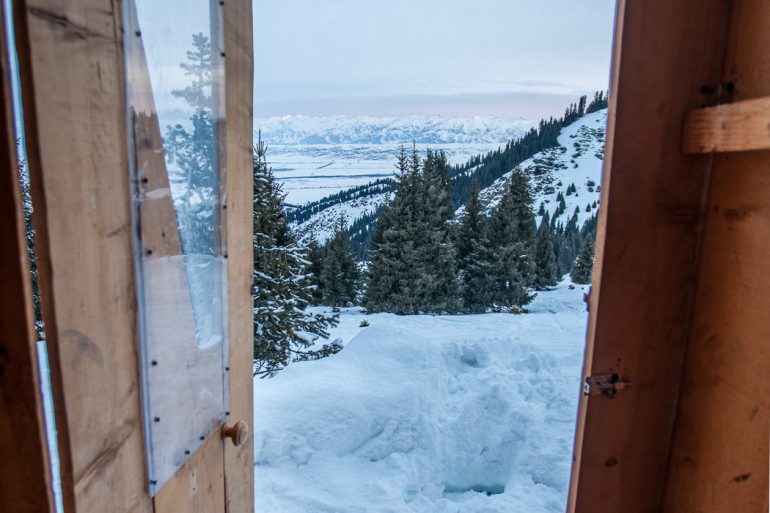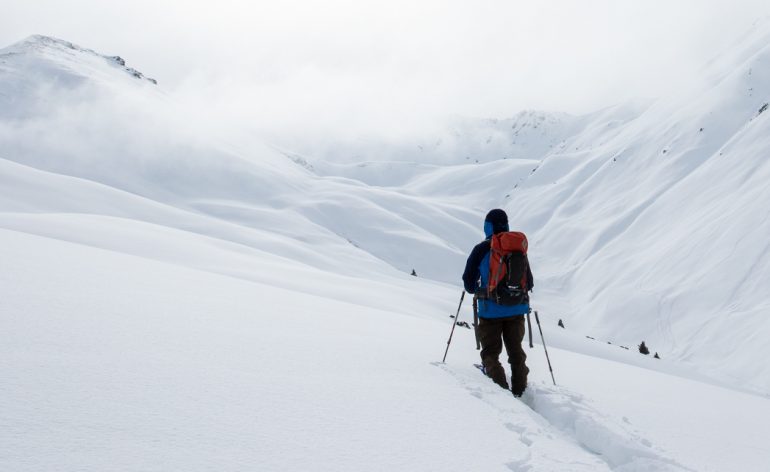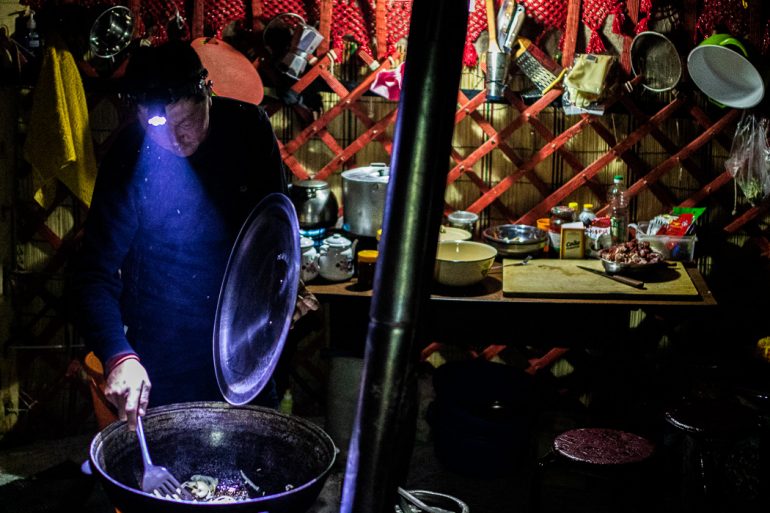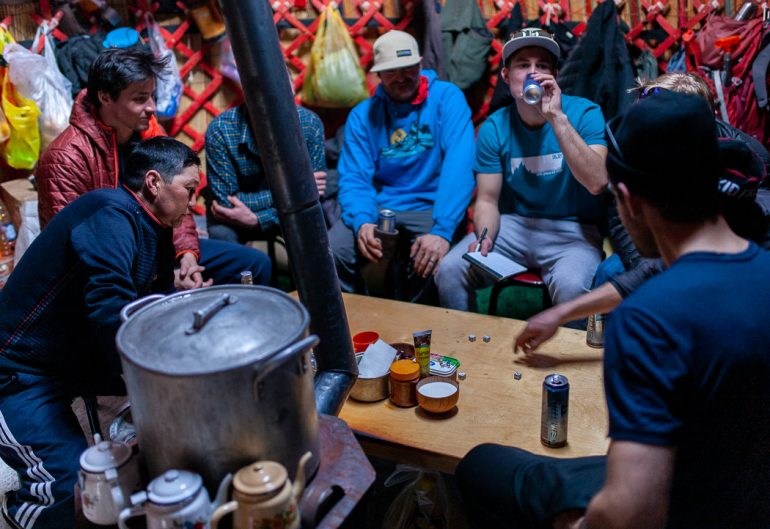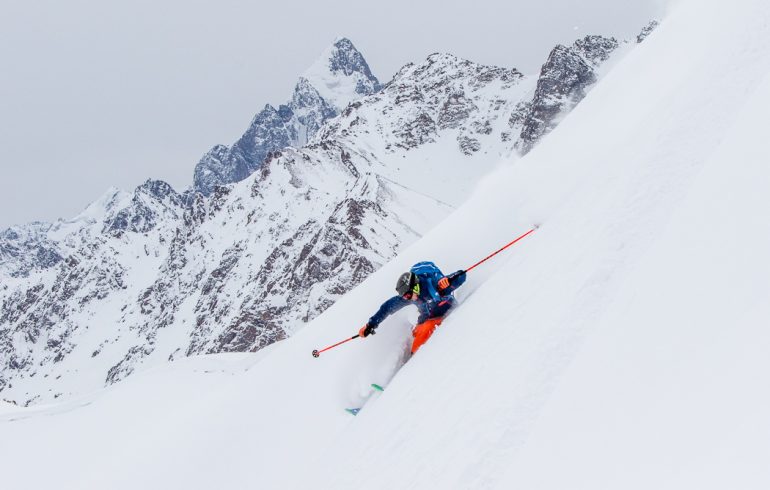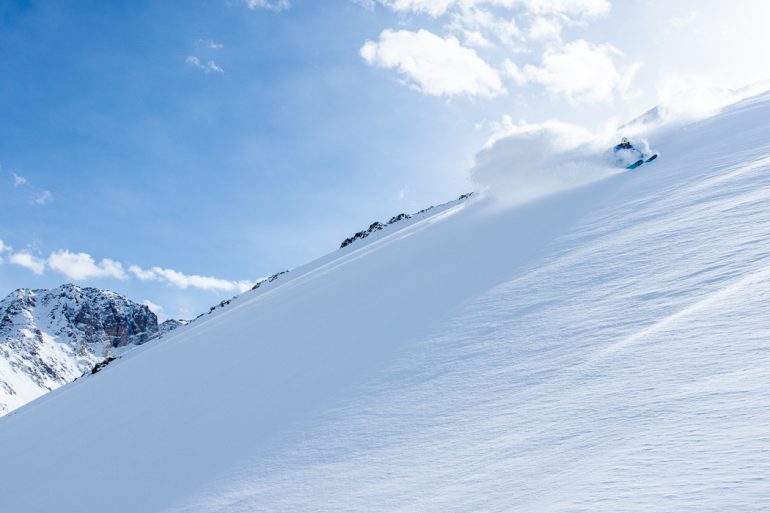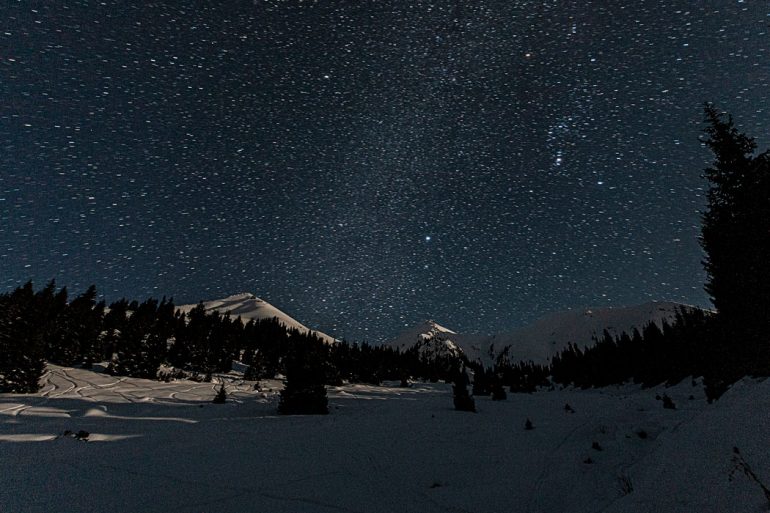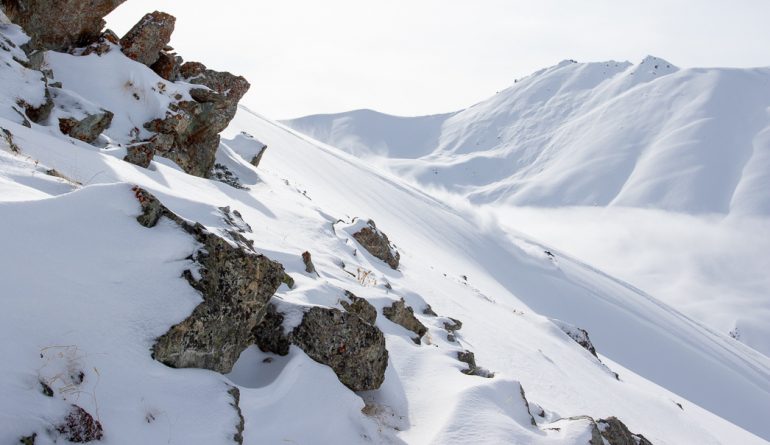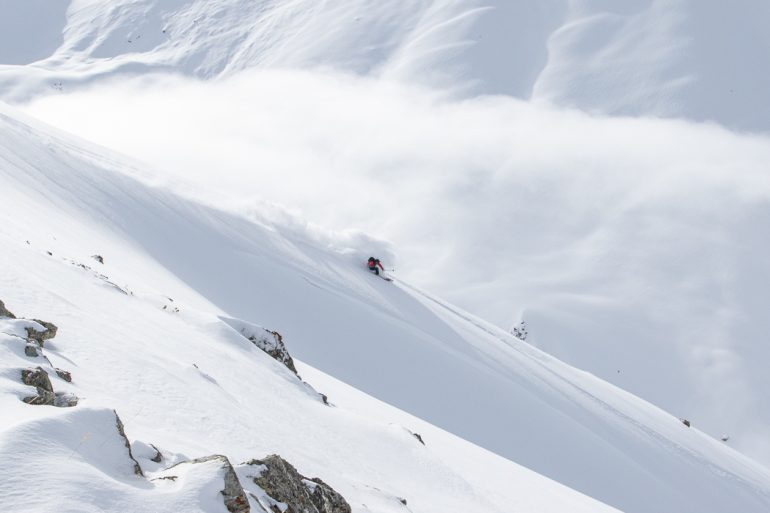Yurts, yahtzee and peak skiing in the former Soviet bloc
Photos and words by Kene Ezeji-Okoye
It’s 5am and I’m slightly delirious. With our connecting flight in Turkey cancelled, we’d spent the night on the floor of an airport in Istanbul, arrived at our destination in Kyrgyzstan a day later than we’d planned, and we were already in trouble.
I’m traveling with five friends who met while living and working in the French Alps. John, Will, Pete and Mark have all since moved back to London while Matt and I both continue to keep the dream alive in the Alps. We’ve made a habit of planning ski trips regularly and over the years have explored a lot of what European skiing has to offer. We were ready to discover what skiing is like further afield.
We’d heard stories about the ex-Soviet bloc Kyrgyzstan – a small central Asian country sharing a border with China – home to huge mountains, deep, untracked powder snow, and an atmosphere reminiscent of the wild-west. Hopefully the stories we’d heard about the snow would hold as true as the outlaw mystique had already proven itself to be.
—
The men appear to be some kind of military police. They don’t speak a word of English or French. None of us speak any Kyrgyz or Russian. We’re not sure exactly what we’ve done, but by the way they’re waving their arms and shouting, it’s pretty clear we must’ve done something.
One of the men takes Matt’s passport and leads him away into a part of the airport that none of us have the security clearance for or, truthfully, any desire to see. We’re still not sure what’s going on.
Helplessly waiting next to the baggage carousels, our collective anxiety rises exponentially over the next 20 minutes. Thankfully, it’s mercifully quelled when our driver arrives and manages to negotiate Matt’s release.
It appears that, despite there not being a non-smoking area in the entirety of the country, Matt having a cigarette outside the airport was ‘illegal’ and necessitated a small ‘fine’ to be paid in US dollars…
With no real harm done our trip begins in earnest as we embark on a seven hour drive that takes us the length of the entire country from the capital city of Bishkek to Karakol, a smaller city that serves as the gateway to the Tien Shan mountain range.
Our final destination for the day is the remote village of Ichke Jergez, nestled at the far end of the high, rocky, foothills. Our driver explains that we’ll need a new method of transport for the final 20 miles — even his trusty Mitsubishi Delica can’t handle the permafrost and potholes of the upcoming rural mountain path.
While unloading our gear, we hear a low rumble that precedes the sight of the UAZ making its way towards us. A remnant of a bygone era, the camouflage green 4×4 personnel carrier lumbers towards us with the aura of a classic VW camper van on steroids.
We tie our kit to the roof and pile into its spartan interior for the comically bouncy 15mph climb to Ichke Jergez where we dine with a local family who make farm-to-table look complex; everything in our dinner is the product of their backyard livestock or garden. The night is spent camped out on the mattress-lined floor of their guest room.
In the morning our porters arrive on horseback clad in mismatched but modern and technical ski outerwear, obvious hand-me-downs from previous guests. They load their saddle bags with our food for the week and whatever personal items we need but can’t carry on our backs.
All of this has been organized by Colorado native Ryan Koupal, who is waiting for us with a smile at the end of our three-hour skin-powered ascent to our basecamp for the week at 8800 feet. Almost incredibly affable, Ryan tells us that the ‘Snow-mo Horses’ have already arrived and offers us a cup of coffee.
We immediately feel right at home in a place that couldn’t be much more alien — three traditional Kyrgyz yurts and an outhouse (with what must be the greatest view of any toilet in the world) make up the entirety of the basecamp. The setup here is a far cry from even the most unique and rustic refuge in the Alps.
The landscape is breathtaking — lofty, jagged peaks surrounding us in three directions. We’ve already started spotting the nearly endless possibilities, a process Ryan refers to as ‘mind-surfing.’ With 11 to 12,000 foot summits encircling the camp, it doesn’t take much imagination for wide Cheshire-cat grins to begin breaking out amongst our group.
—
Incredibly rugged but outstandingly beautiful, over 30 percent of Kyrgyz territory is permanently covered in snow or ice. To call the region mountainous seems like the height of understatement — it’s home to three peaks above 23,000 feet and the average elevation of the country as a whole is nearly 10,000 feet above sea level, although the vast majority of the population live in the valleys much lower down.
Once a popular summer destination for Russian holiday-makers, the fall of the Soviet Union decimated the tourism industry here. There is a notional semblance of a traditional ski scene in Kyrgyzstan with a couple of resorts dotted around Karakol. The largest of these Western-style resorts, Karakol Ski Base, has just five lifts — most of which arrived as secondhand units shipped over after they reached the end of their lifespan in more-mainstream European ski destinations.
Nobody in their right mind would fly from North America or western Europe for a ski holiday in one of these resorts, but surely mountains as truly epic as these would be enough to attract attract a certain type of skier from the world over…
Ryan first came to Kyrgyzstan nearly ten years ago for a film project exploring the potential for winter tourism. Upon discovering the sheer amount of epic terrain in ‘the zone’, that project quickly evolved into 40 Tribes, a backcountry ski and snowboard outfit run in partnership with a handful of locals and few select North-American guides.
The area referred to simply as ‘the zone’ is a portion of the Jalpak Tash region located just to the East of lake Issyk-Kul, the tenth largest lake in the world by volume and, after the Caspian Sea, the world’s second largest salt water lake.
The moisture coming off the lake combined with winter temperatures that hover around 5 degrees for months on end provide a weather phenomenon that is best summed up by another Ryan-ism: ‘lightly dumping’. Snowfall rarely — if ever — seems heavy but rather appears to trickle down gently in tiny crystals like a fine mist which produce a surprisingly large accumulation of champagne powder come morning.
We enjoy a light lunch and set off on a short skin with our guide for the week, Ty Mills, a Canadian splitboard guide who when not in central Asia can usually be found on Rogers or Eagle pass. Ty gives us a safety briefing that underlines the serious nature of being in a location this remote.
Kyrgyzstan, Ty explains, has a mountain rescue service, but not in the way that we’re used to. Their only helicopter is stationed in Bishkek; an eight-hour round trip away, and the nearest western-quality hospital is in Dubai; a further six hours by plane.
The snowpack is also different from our stomping grounds in the Alps. Ty tells us that due to the temperature and climate differences the snow doesn’t ever really bond together. The downside to this is the increased possibility of dry powder avalanches which he terms ‘sluffalanches.’ The upside is a decreased likelihood of the slab avalanches we see at home.
The rest of the week is spent living like tribal kings. The six of us who traveled together share one of the three yurts, which is heated by a wood fired central stove. The guides and staff share the yurt to the far side of the camp and between them is the dining and entertainment yurt where we are fed almost impossibly delicious traditional Kyrgyz meals like the intensely aromatic manti – spiced meat dumplings.
Our chef is none other than Nurbek, the patriarch of the host family we stayed with in Ichke Jergez, who also joins us for the second most popular pastime in the yurt camp: Yahtzee. The dice game is so popular that many of the lines in the area — all first descents claimed by 40 Tribes crew or guests — sport Yahtzee-inspired names like ‘Yurtzee’ or ‘Zero on Ones.’
All week long, from pristine, unblemished wide-open faces, to steep chutes demanding more technical skill and attention, to the gradually mellowing pillow-filled tree runs back to camp — whatever the terrain — the snow is as close to perfect as any of us has ever had it.
Each day begins in the central dining yurt with a hot breakfast and a cup of coffee before setting out away from camp on the approach skin. A low-angled, gradually inclining ramble in one of three directions takes us to the top of the treeline, around 10,000 feet. From there a selection of 12,000+ foot peaks hang like fruit on a tree, ripe for the picking.
Some of our group have our sights on ‘The Gamburger Stand’, a steep, rocky North-facing run at the far end of the range, named for a tiny stall on the main street of Karakol that sells a kind of doner/hamburger hybrid. Eventually, we decide to give it a miss and focus on lower-hanging fruit that is more easily accessed. Some of us (i.e. me) are still slightly annoyed about this choice despite every run we touch all week long being as good as gold.
The line of the trip for the group as a whole is Zero on Ones: a gradually steepening series of switchbacks gained a lofty shoulder with staggering views down to the yurts and across the plain towards the Kazakhstani border some 12,000 feet below. Dropping off the back, the descent began with some billy-goating behind a wind-lip to a rounded knuckle, before plunging on to a massive open face, primed with cold smoke powder.
Ryan’s unofficial slogan for 40 Tribes, ‘always never-not powder shredding,’ holds true for the week and our legs feel the strain every night, as much from the dramatically long descents back to basecamp as from the hikes up. By the end of our time in Jalpak Tash we’re sad to leave but ready to head back to our respective homes for a day or two of downtime.
Our last night in Kyrgyzstan, wandering the streets of Bishkek taking in the sights and enjoying a few beers, we all agree that despite a rocky start the trip had been perfect and everything had gone off without a hitch. Unfortunately, Pete relieves himself in an alleyway and the AK-47-carrying guard running towards him doesn’t seem to be very happy about it…
Kene Ezeji-Okoye is from a small, flat town in the Canadian prairies where he spent his winters playing hockey and basketball. He first tried snowboarding while traveling through Europe after university and liked it enough to call the French Alps home for the last decade. He currently works for ski lesson booking platform SkiBro, based in Val Thorens, France.
Looking for some more shoulder-season stoke? Check out our other trip reports and sign up for our weekly roundup newsletter. [mc4wp_form id=”26300″]
Beyond our regular guest bloggers who have their own profiles, some of our one-timers end up being categorized under this generic profile. Once they do a few posts, we build a category. In any case, we sure appreciate ALL the WildSnow guest bloggers!

